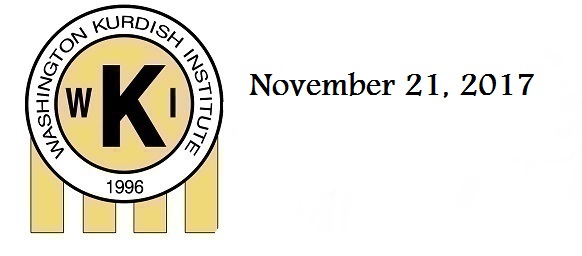949
Iran
- More than a week after the deadly earthquake hit the Kurdish areas in Iran, the Kurdish population continues to suffer from lack of aid and supplies by the Iranian regime. After the release of several videos of civilians criticizing the government and praising Kurdish activists for collecting aid and delivering it to affected people, the Iranian secret police arrested many of the aid collectors. Over 400 people died as a result of the earthquake, while about 700 people were injured and thousands are displaced.
- Iranian border guards shot three Kurdish border porters known as Kolbar. The Kurdistan Human Rights Association(KMMK) confirmed that Hassan Muradi, a Kurd, was killed due to the fires and two other Kurdish Kolbars were injured and hospitalized in Piranshahr city.
Iraq
- The Iraqi Federal Court ruled to annul the Independence Referendum of Kurdistan region; calling it “unconstitutional.” In a reaction to the decision, the Kurdistan Regional Government (KRG) Prime Minister Nechirvan Barzani described it as “unilateral.” Barzani called for implementation of the constitution in its “entirety,” not only certain articles. Barzani said during his phone call with Secretary of State Rex Tillerson that he expressed KRG’s commitment to dialogue with Baghdad. Meanwhile, the KRG released a statement calling for the international community to intervene with the Iraqi government to “end its collective measures against the people and government of the Kurdistan Region.” As the airports in the Kurdistan region remain closed by Iraq’s government the KRG statement states: “humanitarian needs of displaced people and the basic needs of our general population, including emergency medical evacuation of civilians as well as victims and military personnel wounded in the fight against ISIS.”
- On November 20th, in a request to Iraq’s Parliament, six Kurdish lawmakers in Kirkuk called for the removal of the acting Sunni Arab Governor Rakan Saed. The letter called on the Parliament to vote out Saed from his post due to his racist policies against the people of Kirkuk since he took over the office last month. Earlier this week, the Iraqi parliament attempted to vote to dissolve the Kirkuk Provincial Council, which is controlled by Kurdish majority. Tensions remain high in the city of Kirkuk after Iranian-backed militias took over the city and other disputed areas with the KRG last month.
Syria
- The “Al-Jazeera Tempest” military campaign continued to liberate Deir Ez Zour of ISIS. On November 14th, the Syrian Democratic Forces (SDF) liberated 6 villages, including those southeast of the city, and killed 16 ISIS terrorists. The SDF also liberated the Al Tanek oil field, which is one of the largest oil fields in the area. ISIS terrorists attempted to retake the oil field but their attack was repelled by the SDF. As the number of the Internally Displaced People (IDP) increased by Deir Ez Zour, the Kurdish Red Crescent provided medicine and aid to the IDPs after they escaped from ISIS.
- In the Afrin region, west of Syria, the Turkish-backed Islamic groups continued shelling the Kurdish areas with mortars. The Kurdish People’s Defense Units (YPG) responded to the shellings without any advance in the clashes by any side. On Friday November 17th, Turkey’s President Recep Tayyip Erdogan threatened the Syrian Kurds to “cleanse Afrin” of the Kurdish YPG. The YPG released statistics of the attacks on Afrin in 2017 by Turkey and its supported groups, which stated that there were 576 attacks by light, medium and heavy weapons such as mortars and machine guns. The YPG said that 12 civilians have been killed due to the attacks including a 14-year-old boy and a pregnant woman.
- The Kurdish National Coalition (KNC) in Syria decided to participate in the upcoming elections in Northern Syria Federalism after they boycotted the first round in September. The second phase of the elections is to elect the members of the local councils in the northern region of Syria. In a statement, the KNC said: “We the Kurdish National Coalition in Syria believe in the importance of contributing to the promotion of democracy in the society.” The KNC announced their goals for the future of Northern Syria by laying out several agendas focusing on equality, coexistence, and basic services.
Turkey
- The Turkish authorities rejected an appeal by lawyers to visit the imprisoned Kurdish leader Abdullah Ocalan. Requests by Ocalan’s lawyers to visit him were rejected 704 times since July of 2011. Turkish authorities rejected the visit requests for various reasons, including “weather conditions,” and “state of emergency.” Meanwhile, Kurds in Germany and other European countries continued protests, demanding to hear from Ocalan. The Turkish government last allowed a family member to visit Ocalan in September of 2016. Some European lawmakers expressed concerns regarding the lack of information about Ocalan.
- Turkish police arrested more members of the Peoples’ Democratic Party (HDP) and Democratic Society Congress (DTK) in Ankara, Antalya, and Diyarbakir (Amed). Also, last week an unknown gunman fired shots at the HDP branch in Esenler district in Istanbul. Property damage was reported with no casualties. Since the Turkish government ended the peace process with the Kurdistan Workers’ Party (PKK) in 2015, 11 thousand members of Kurdish parties have been jailed.

